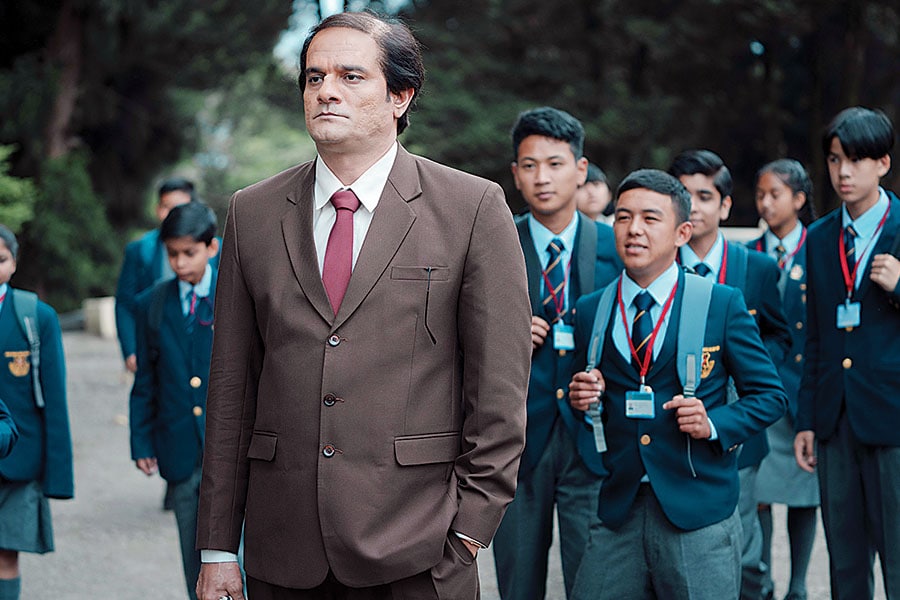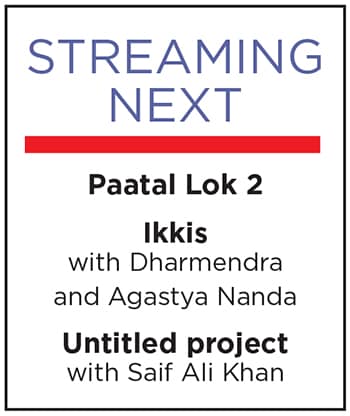For someone who is more than six feet tall and had once wanted to join the Indian Army, it’s hard to believe that there is a lighter side to a man we’ve mostly seen in dark, gritty and intense dramas.
Blame it on the roles the 43-year-old has played so far.
For instance, the stoic and reclusive mathematics professor, Naren Vyas, from the recently released Jaane Jaan (2023), or going back to his role as Shahid Khan, a complex character with shades of grey, in Gangs of Wasseypur (2012). Sprinkle it with a few villainous ones in the middle in movies such as Aakrosh (2010) and Khatta Meetha (2010) a terrorist in Vishwaroopam (2013) and a gangster in Raees (2017).
However, those who know him know that while he’s an introvert, he’s also not a serious person, he says. “I’m scared that people have formed this image. I just have a serious face," he jokes. “I can’t make small talk. I like listening more than talking," he adds.
He may not always have been like that. “I was a very angry person," he admits. “Acting has changed two things in me. I’m still short-tempered, but I’ve sobered up a lot. And, I’m not judgemental anymore."
Shattered dreams
Growing up in Kharkhara, a village in Haryana’s Rohtak district, Ahlawat wanted to join the armed forces. However, he could not clear the Service Selection Board interviews to get into the Combined Defence Services (CDS), based on which students are shortlisted for admission to the National Defence Academy and the CDS. As a boy, all of 19 or 20, he was “angry and heartbroken", he says. “I thought there was nothing else I could do, and I didn’t want to do anything else."
The rage was building up, and he found theatre as a medium to let go of his emotions. His parents, along with being farmers, were also school teachers. Therefore, Ahlawat cultivated a liking for literature. This helped him understand the nuances of theatre better. “People thought I was an energetic actor with a lot of intensity, but instead I was releasing my frustration," he says.
In the meantime, he also finished pursuing his MA in English Literature. When he watched a play revolving around the theme of destiny versus character—you can’t change what’s written for you—he made peace with not being in the Army. He met the same play’s director, Sunil Chitkara, who eventually ended up becoming Ahlawat’s first mentor and guru. On his advice, he went to Pune’s Film and Television Institute of India (FTII).
![]()
“There I realised, this is a job I love. When you become a student of FTII, you think about cinema differently. You start learning the craft, the process," he says. “Those two years became very prominent and useful for me."
It wasn’t until the end of the first year that Ahlawat realised that he could be a professional actor. “I was there to learn acting and had the option of going back to theatre," he says. “After the first year, I thought Mumbai was my destiny."
He graduated in January 2008, shuttled between Mumbai, Pune and Rohtak, and finally moved to the city of dreams after nine months, in September. This time, there was no fear of heartbreak.
“To get into the Army, there are parameters. For acting, there are none. Who’s going to tell you that you’re not an actor? It’s you who decides whether you are one or not," he says. “The problem is that most people don’t scrutinise themselves enough. You only need to work on yourself. When you do that enough, the first thing that goes away is the fear of failure," he adds.
Dream come true
Ahlawat started his career with two of Priyadarshan’s films in the same year—the action thriller Aakrosh (2010) and the comedy Khatta Meetha (2010). He earned critics’ praise for playing a shady politician in the latter. He also made small appearances in the Ranbir Kapoor-starrer Rockstar (2011), and Bedabrata Pain’s Chittagong (2012), a movie that ended up winning three National Awards for best debut director, and the other two for music. His roles in these films showcased his versatility in portraying characters with various shades and motivations.
It was in 2012, when Ahlawat’s role as Shahid Khan in Anurag Kashyap’s crime film Gangs of Wasseypur (GoW) not only garnered critical acclaim but also marked a turning point in his career, leading to increased visibility. He was praised for delivering a compelling performance, showcasing range and versatility as an actor.
![]() Ahlawat plays a stoic and reclusive mathematician in Jaane Jaan
Ahlawat plays a stoic and reclusive mathematician in Jaane Jaan
However, it wasn’t until his role as Hathiram Chaudhary in Avinash Arun Dhaware and Prosit Roy’s crime thriller web series Paatal Lok (2020) that the actor got his due. It was the first time he was playing a lead role, and it served as a career-defining moment for Ahlawat.
His depiction of a seasoned-yet-overlooked officer, who faces personal and professional challenges, leading to frustration and moments of vulnerability, solidified his reputation as an actor who could play diverse roles, not just baddies. The role earned him his first Filmfare Award for best male actor in a drama series.
“GoW reached the people making movies," says Ahlawat. “Hathiram changed my life," he adds. Before Hathiram, he says, he was being offered characters who are dominant and who know what they want to do in life. “I think that’s also a reason why people saw me as someone who cannot look weak. Hathiram made them believe that a six-foot-tall person can cry, be vulnerable, and be scared. So, it’s not like I could not show these emotions or play these characters, it’s just that you never tried me," he tells Syed Mohd Irfan in his show, Guftugu.
![]()
In between playing Shahid and crowd-favourite Hathiram, Ahlawat was seen in Commando (2013), and another game-changer in his career, Raazi (2018), with Alia Bhatt and Vicky Kaushal, among other projects. Playing RAW agent Khalid Mir, Ahlawat got the opportunity to be the good cop this time, propelling him to widespread recognition.
“I remember when I first saw him in GoW. I was appalled and stunned by how good he was. Then it took him all those years to do Paatal Lok, which was such a loss for the Indian film industry," says film critic Anupama Chopra. “He is just a fantastic actor who is not afraid of playing anything. He can be terrible, and lovely, and you will believe him in every role. He has that conviction and the ability to create a character who feels so true," she adds.
Raazi’s director Meghna Gulzar recalls Ahlawat as an actor who gives a performance that is far from a director’s expectations. “He brings an unusual interpretation of a character to the table. It’s extremely gratifying when an actor can interpret every line in such depth," Gulzar says.
![]()
Among the most memorable incidents, she recounts, is when she had instructed Ahlawat to never let her know what his character, Mir, is thinking. At the table read of the script, he went through it cold. “At the rehearsals, the character was unfolding layer by layer. His biggest strength is his unpredictability. You never know which way he’s going to turn and you don’t know which character he is going to portray next," she says.
Rooted and humble
For Ahlawat, while it was his first day as a professional actor on the sets of Aakrosh, which will always be special although he says he was “trembling", Raazi is a movie close to his heart. “I remember Gulzaar saab sitting at the monitor. It was my first shot in front of him. I will never forget that day," he says.
Ahlawat has come a long way from being the one who was once anxious to being the one boosting a director’s confidence. “Jaideep hai toh accha ho jayega (If Jaideep is there, it will be good)," says Dhaware, who directed Ahlawat on Paatal Lok and, most recently, Three of Us (2023).
“He’s a rare mind, a rare actor, who sees filmmaking in its totality. He’s not only focussed on his character, but the whole scene. He has a filmmaker’s mind," Dhaware adds.
![]()
In Three of Us, like in Jaane Jaan (2023), Ahlawat was seen playing riveting and pivotal roles, with critics calling them “shining", “compelling", performances. His Three of Us co-star Shefali Shah says, “Even with his imposing presence, he’s extremely malleable. He has a strong-yet-gentle side to him, which is why he can portray such vivid characters."
Chopra can vouch for the humility the man possesses. At the Himalayan Film Festival she recently hosted in Leh, which opened and closed with Ahlawat’s movies Jaane Jaan and Three of Us, she said she couldn’t invite the actor due to budget constraints. “He flew himself, gave interviews, and was there for the audience. It was so generous of him to give his time, money and support a film and a filmmaker he believes in."
![]() Ahlawat’s generosity comes through on screen as well, as an actor who is affable and identifiable, Gulzar feels. “There is something rooted in his interpretation of characters, making the performance look effortless, and that connects with the audience," says Gulzar.
Ahlawat’s generosity comes through on screen as well, as an actor who is affable and identifiable, Gulzar feels. “There is something rooted in his interpretation of characters, making the performance look effortless, and that connects with the audience," says Gulzar.
That is what success means for him. “I’m thankful to the viewers, producers, directors and actors that they relate to me and accept me as an actor."
What lies ahead? The release of a mix of web series and movies, including Paatal Lok 2, Ikkis with Dharmendra and Agastya Nanda, and an untitled project with Saif Ali Khan.
“I’ve started having fun in the past few years. When you get out of the circle of self-doubt, true learning starts then. I didn’t set any goals all I knew was that I love acting. I will do it as long as possible, for as long as I live," Ahlawat signs off.






 Ahlawat’s generosity comes through on screen as well, as an actor who is affable and identifiable, Gulzar feels. “There is something rooted in his interpretation of characters, making the performance look effortless, and that connects with the audience," says Gulzar.
Ahlawat’s generosity comes through on screen as well, as an actor who is affable and identifiable, Gulzar feels. “There is something rooted in his interpretation of characters, making the performance look effortless, and that connects with the audience," says Gulzar.